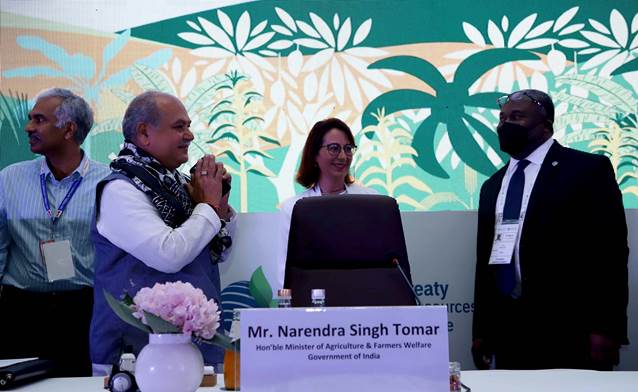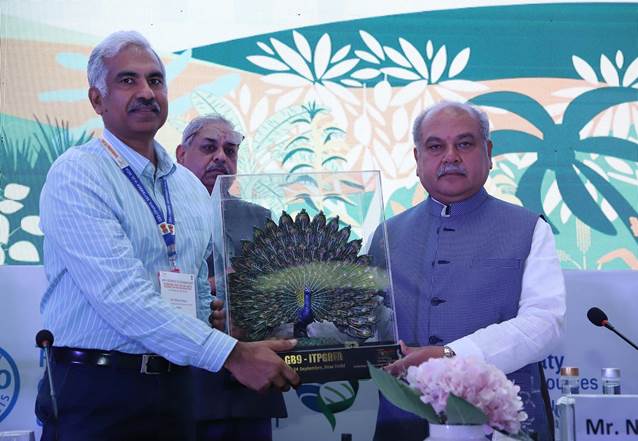Union Minister of Agriculture and Farmers Welfare, Shri Narendra Singh Tomar has said that plant genetic resources are the source of solution to the breeding challenges. Plant genetic resources are also vulnerable due to habitat destruction and climate change. Their protection is a “shared responsibility of humanity”. We must use all modern technologies as well as traditional knowledge to preserve and use them in a sustainable manner.
Shri Tomar said this while inaugurating the Ninth Session of the Governing Body of the International Treaty on Plant Genetic Resources for Food and Agriculture (ITPGRFA) in New Delhi today. The ITPGRFA is a legally binding comprehensive agreement signed during the 31st session of the United Nations Food and Agriculture Organization (FAO) in Rome in November, 2001, which took effect on 29 June 2004, and currently has 149 Contracting Parties including India. This treaty, in consonance with the Convention on Biological Diversity, seeks to achieve food security through the conservation, exchange and sustainable use of the world’s Plant Genetic Resources for Food and Agriculture (PGRFA), equitable sharing of profits from its use, as well as playing an important role in the recognition of rights of farmers. PGRFA provides scale-free solutions to achieve food and nutritional security as well as climate resilient agriculture. Countries are mutually interdependent for the PGRFA, leading to the need for a global system to facilitate access and profit sharing. GB9 is being organized under the theme “Celebrating the Guardians of Crop Diversity: Towards an Inclusive Post-2020 Global Biodiversity Framework”. The theme aims to highlight the contribution of the world’s small farmers to the effective management of PGRFA and provide an opportunity to consider how the treaty and its community can contribute to the new global biodiversity architecture.
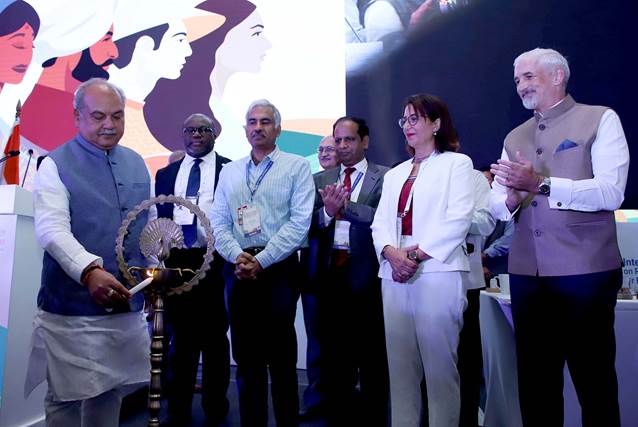 In the inaugural session, Shri Tomar said that the aim of the Plant Treaty is to recognize the contribution of farmers and local communities to the diversity of crops. Over the centuries, tribal and traditional farming communities have continuously shaped and adapted the dimensions of the rich genetic material they have. This has given rise to vast and diverse cultural (life and commerce around plant diversity), culinary (incredible variety, tastes and nutrition as per purpose and season) and curative (food as medicine) practices. Shri Tomar said that the COVID pandemic has taught us some lessons. Availability and access to food is paramount to peace and stability. India remains committed to ensuring food and nutritional security for its citizens. Shri Tomar said that we need to ensure bountiful crop production year after year. The answer is crop diversity and diversification.
In the inaugural session, Shri Tomar said that the aim of the Plant Treaty is to recognize the contribution of farmers and local communities to the diversity of crops. Over the centuries, tribal and traditional farming communities have continuously shaped and adapted the dimensions of the rich genetic material they have. This has given rise to vast and diverse cultural (life and commerce around plant diversity), culinary (incredible variety, tastes and nutrition as per purpose and season) and curative (food as medicine) practices. Shri Tomar said that the COVID pandemic has taught us some lessons. Availability and access to food is paramount to peace and stability. India remains committed to ensuring food and nutritional security for its citizens. Shri Tomar said that we need to ensure bountiful crop production year after year. The answer is crop diversity and diversification.
Shri Tomar said that no negotiation is possible at the cost of food security. All international forums must not forget that food is an essential fundamental right. Developing countries will be motivated by the need to ensure that the rights of farmers producing food are never compromised. This community is also responsible for the existence of plant genetic resources that we have today. We have many places and people around the world who have conserved invaluable genetic resources and valuable traditional knowledge. Emphasizing on the timely conservation and use of wild species of crops as well as potentially underutilized crops, he said that our struggle for climate resilient agriculture and nutritional security depends heavily on your decisions and actions. Shri Tomar said that genetic information obtained using advanced genomic and bio-informatic tools has the potential to become the subject of IPR. On the other hand, traditional knowledge that has been preserved and enriched from generation to generation becomes common knowledge. Multilateral fora such as the ITPGRFA are responsible for balancing commercial interests and heritage values to ensure the continuity of PGR conservation on earth.
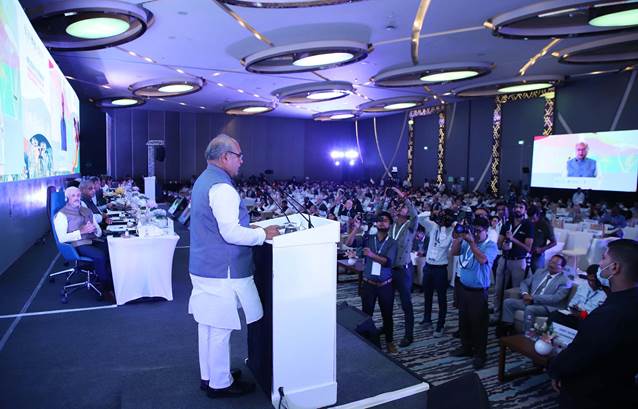
Shri Tomar said that India has been a firm advocate of sharing the wealth of plant genetic resources. A look at the IARC genebank and other national gene banks shows that about 10% of the germplasm is of Indian origin. Our vision is very clear that the genetic resources of plants should be made available for research and sustainable use. Shri Tomar said that we cannot ignore the contribution of farmers, indigenous communities, tribal population and especially the women of the community in the conservation and selection of plant genetic resources over time. Therefore, we have a duty to keep their interests in mind while considering amendments and improvements to the Treaty. India stands firm in its faith and actions in the commitments of the multilateral agreement. He said that Article 9 of the ITPGFRA deals with the rights of farmers, which India is fully compliant with and relevant provisions are contained in the PPV&FR Act, 2001. 166 farmers/agriculture communities have been honoured with Plant Genome Saviour Awards. He said that India proposes to the Governing Body of ITPGRFA to consider putting into action a module of Awareness, Outreach and Capacity Building Programme related to Farmers’ Rights, for which India will support its implementation.
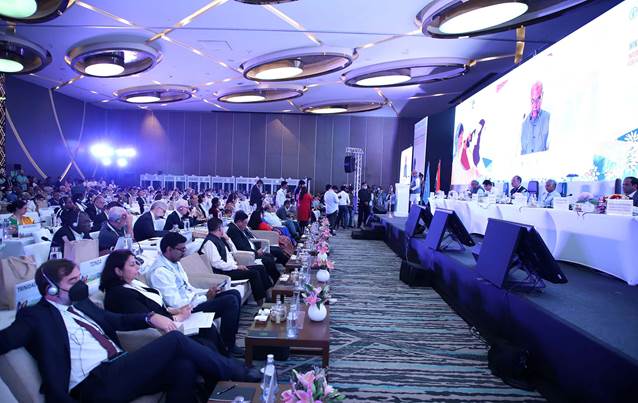
Shri Tomar said that global agricultural research is focusing on a few key crops for obvious reasons. Focusing on minor millets, minor pulses, minor fruits and leafy vegetables, he said that the Indian Council of Agricultural Research (ICAR) has a network of institutions working on these crops. We have encouraged our farmer-conservers to join us for the GB-9. Shri Tomar said that under the leadership of Prime Minister Shri Narendra Modi, agriculture is progressing in the country, farmers are prospering and the economy is also being strengthened. Many such infrastructures have been built in the country which inspires the country and can also show the way forward to the world.
Shri Tomar also expressed his immense pleasure that the Treaty Board and the Contracting Parties had honoured his call for India to host the meeting, made during GB8 meeting which was held at Rome in 2019, in which he had participated.
Shri Manoj Ahuja, Secretary, Department of Agriculture & Farmers Welfare, GoI, while welcoming all the dignitaries, briefly elaborated about the strength of Indian agriculture and the significant progress made in the recent past due to progressive policies of the government. He urged that deliberations during the GB9 must lead to a balance in between genetic resources governance with use, investment with innovation and access with Benefit Sharing to achieve future-ready solutions for agriculture and food security.
Ms Yasmina El-Bahloul, Chairperson of GB9 Bureau, welcomed all the delegates on behalf of the Treaty Bureau and thanked the Indian government for the warm hospitality and extraordinary arrangement for hosting the GB9.
Dr Dongou Qu, Director General, FAO, joined the session virtually. While thanking GoI for hosting the GB9 of the ITPGRFA, he said the Plant Treaty was universal and PGRFA needs sharing and caring for food security. These resources are important for agricultural resilience, especially in changing climate.
Mr Shombi Sharp, UN Resident Coordinator, India, welcomed delegates on behalf of the United Nations and expressed happiness that UN was associated with the very important Treaty. He called for global solutions for global problems, especially since PGRFA plays a significant role in safeguarding agricultural production crops and thereby the farming community.
Dr Himanshu Pathak, Secretary, Department of Agricultural Research and Education and Director General, Indian Council of Agricultural Research emphasized on the role of Research & Development institutions as well as well-trained human resource for effective management of PGRFA. He informed delegates about the excellent capacity of ICAR along with State Agricultural Universities for germplasm management and use. He offered interested nations to enhance the utilization of gene-pool through capacity building programmes by India in genebanking and in trait-specific evaluation.
After the inaugural ceremony, Shri Tomar visited the farmers’ exhibitions and interacted with them. More than 400 delegates from nearly 150 member-countries have assembled during the six-day long GB9 to deliberate upon the ITPGRFA which oversees how the member nations exchange and sustainably use the world’s Plant Genetic Resources for Food and Agriculture, while ensuring fair and equitable benefit sharing arising from its use. The PGRFA are the basic building blocks upon which agricultural development, therefore, food security depends, especially on the climate change and other related challenges.
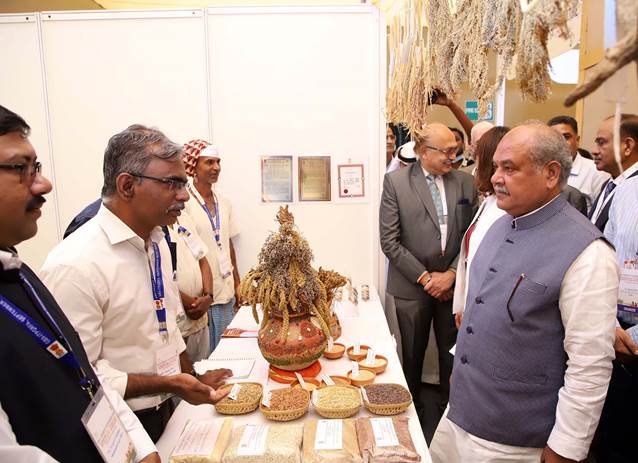
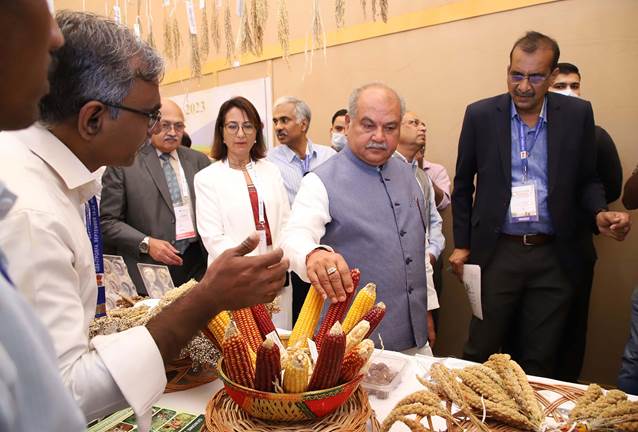
The major issues to be deliberated during the meeting comprise (i) Amendment of the Treaty to expand the list of crops in the multilateral system; (ii) Capacity-development strategy for the Treaty; (iii) Funding strategy, resource mobilization and the budget; (iv) Conservation and sustainable use of PGRFA and agriculture; (v) Compliance; (vi) Cooperation with other organizations and bodies; and (vii) Multi-year Programme of Work, including genome sequence information to pursue a more robust Treaty implementation. As host of GB9, India is expected to play a crucial role in minimizing the dissonance between technology-rich developed and gene-rich developing countries to achieve functional resolutions on critical agenda items. The GB9 also provides an excellent opportunity to convey the steadfast commitment of India to conservation and sustainable utilization of plant genetic diversity as well as farmers’ rights. On the eve of GB9, India called for a global harmony to use every available germplasm resource and every advanced technology to fight global hunger and ensure food and environmental security.
